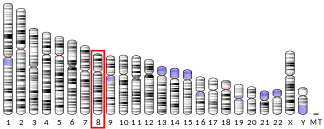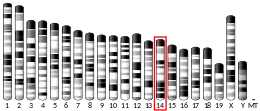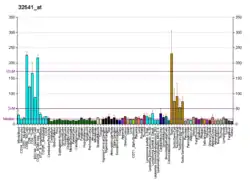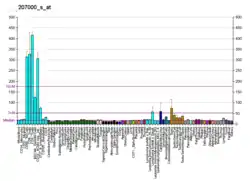PPP3CC
Serine/threonine-protein phosphatase 2B catalytic subunit gamma isoform (PP2BC) is an enzyme that in humans is encoded by the PPP3CC gene.[5][6]
Calmodulin-dependent protein phosphatase, calcineurin, is involved in a wide range of biologic activities, acting as a Ca(2+)-dependent modifier of phosphorylation status.
In testis, the motility of the sperm is thought to be controlled by cAMP-dependent phosphorylation and a unique form of calcineurin appears to be associated with the flagellum. The calcineurin holoenzyme is composed of catalytic and regulatory subunits of 60 and 18 kD, respectively.
At least 3 genes, calcineurin A-alpha (CALNA1; MIM 114105), calcineurin A-beta (CALNA2; MIM 114106), and calcineurin A-gamma (CALNA3), have been cloned for the catalytic subunit. These genes have been identified in humans, mice, and rats, and are highly conserved between species (90 to 95% amino acid identity).[supplied by OMIM][6]
References
- GRCh38: Ensembl release 89: ENSG00000120910 - Ensembl, May 2017
- GRCm38: Ensembl release 89: ENSMUSG00000022092 - Ensembl, May 2017
- "Human PubMed Reference:". National Center for Biotechnology Information, U.S. National Library of Medicine.
- "Mouse PubMed Reference:". National Center for Biotechnology Information, U.S. National Library of Medicine.
- Muramatsu T, Kincaid RL (Nov 1992). "Molecular cloning and chromosomal mapping of the human gene for the testis-specific catalytic subunit of calmodulin-dependent protein phosphatase (calcineurin A)". Biochem Biophys Res Commun. 188 (1): 265–71. doi:10.1016/0006-291X(92)92379-C. PMID 1339277.
- "Entrez Gene: PPP3CC protein phosphatase 3 (formerly 2B), catalytic subunit, gamma isoform".
Further reading
- Esau C, Boes M, Youn HD, et al. (2001). "Deletion of Calcineurin and Myocyte Enhancer Factor 2 (MEF2) Binding Domain of Cabin1 Results in Enhanced Cytokine Gene Expression in T Cells". J. Exp. Med. 194 (10): 1449–59. doi:10.1084/jem.194.10.1449. PMC 2193671. PMID 11714752.
- Strausberg RL, Feingold EA, Grouse LH, et al. (2003). "Generation and initial analysis of more than 15,000 full-length human and mouse cDNA sequences". Proc. Natl. Acad. Sci. U.S.A. 99 (26): 16899–903. doi:10.1073/pnas.242603899. PMC 139241. PMID 12477932.
- Bennasser Y, Badou A, Tkaczuk J, Bahraoui E (2003). "Signaling pathways triggered by HIV-1 Tat in human monocytes to induce TNF-alpha". Virology. 303 (1): 174–80. doi:10.1006/viro.2002.1676. PMID 12482669.
- Gerber DJ, Hall D, Miyakawa T, et al. (2003). "Evidence for association of schizophrenia with genetic variation in the 8p21.3 gene, PPP3CC, encoding the calcineurin gamma subunit". Proc. Natl. Acad. Sci. U.S.A. 100 (15): 8993–8. doi:10.1073/pnas.1432927100. PMC 166426. PMID 12851458.
- Ota T, Suzuki Y, Nishikawa T, et al. (2004). "Complete sequencing and characterization of 21,243 full-length human cDNAs". Nat. Genet. 36 (1): 40–5. doi:10.1038/ng1285. PMID 14702039.
- Barrios-Rodiles M, Brown KR, Ozdamar B, et al. (2005). "High-throughput mapping of a dynamic signaling network in mammalian cells". Science. 307 (5715): 1621–5. doi:10.1126/science.1105776. PMID 15761153. S2CID 39457788.
- Eastwood SL, Burnet PW, Harrison PJ (2005). "Decreased hippocampal expression of the susceptibility gene PPP3CC and other calcineurin subunits in schizophrenia". Biol. Psychiatry. 57 (7): 702–10. doi:10.1016/j.biopsych.2004.12.029. PMID 15820226. S2CID 39744063.
- Kinoshita Y, Suzuki T, Ikeda M, et al. (2006). "No association with the calcineurin A gamma subunit gene (PPP3CC) haplotype to Japanese schizophrenia". Journal of Neural Transmission. 112 (9): 1255–62. doi:10.1007/s00702-004-0261-5. PMID 15843870. S2CID 143604.
- Liu YL, Fann CS, Liu CM, et al. (2008). "More evidence supports the association of PPP3CC with schizophrenia". Mol. Psychiatry. 12 (10): 966–74. doi:10.1038/sj.mp.4001977. PMID 17339875.
- Horiuchi Y, Ishiguro H, Koga M, et al. (2008). "Support for association of the PPP3CC gene with schizophrenia". Mol. Psychiatry. 12 (10): 891–3. doi:10.1038/sj.mp.4002019. PMID 17895921.





